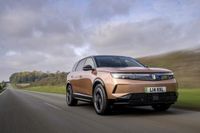Electric vehicles (EVs) have long been heralded as the future of transportation, but in the United Kingdom this summer, the EV landscape is shifting faster than ever. With major insurers like Allianz UK pledging to electrify their fleets, mainstream brands such as Vauxhall introducing honest, value-driven models, and Tesla’s once-dominant position facing unprecedented headwinds, the race to win over the British EV driver is heating up—and the stakes have never been higher.
On August 15, 2025, Allianz UK made headlines by announcing a bold commitment: by the end of 2030, its entire employee car fleet will be fully electric. As reported by Fleet World, more than a quarter of Allianz UK’s corporate fleet is already electric, with 307 EVs making up 28% of its vehicles. This year alone, the company ordered 160 new electric vehicles, underscoring its determination to lead by example in the insurance sector’s green transition.
"This move is an important one for us and underscores our commitment to sustainability, not only as an insurer but also as an employer. To support our customers across the country we need our employees on the road in vehicles fit for purpose that also align with our net zero strategy. By driving towards a greener future we are being clear in our aims and taking action to achieve them," said Bethany Thomas, head of sustainability at Allianz UK, in a statement to Fleet World.
Allianz’s EV pledge isn’t just corporate window-dressing. It aligns with the EV100 initiative, a global campaign led by the Climate Group, uniting companies to accelerate the transition to electric vehicles. To ensure a smooth changeover, Allianz UK’s procurement team organized employee panels to test drive and benchmark a range of EVs, including adapted vehicles for drivers with different physical needs. The company also launched a new driver app for accurate business mileage recording and emissions tracking—a key part of its sustainability strategy aiming for a 70% reduction in greenhouse gas emissions per employee by 2030 (already achieving a 47% reduction in 2024 from a 2019 baseline).
But what about the cars themselves? The British EV market is no longer just about Tesla’s high-tech allure or luxury price tags. Enter the Vauxhall Grandland Electric, a model that, according to a recent EV Powered review, offers a refreshing “back to basics” approach in a world of over-hyped, hyper-styled electric crossovers.
The Grandland Electric, built on the Stellantis STLA-medium platform (shared with the Peugeot e-3008 and Jeep Compass, among others), may not turn heads like a Tesla, but it’s winning hearts with its simplicity, practicality, and value. The top-tier Ultimate trim, priced at £37,895 before the UK Government’s £1,500 Electric Car Grant, comes loaded: 20-inch diamond-cut alloys, a 16-inch infotainment display, a 10-inch instrument cluster, physical climate controls, a premium Focal sound system, wireless charging, heated seats and steering wheel, a panoramic glass roof, and even a heat pump for chilly mornings. The Grandland’s 73kWh battery delivers 210bhp, a 0-62mph sprint in 9 seconds, and a real-world range of about 250 miles (325 miles WLTP). Charging from 20% to 80% takes just 26 minutes at up to 160kW.
As EV Powered notes, “The Vauxhall Grandland Electric isn’t exactly poster material… but it quietly gets on with being an extremely affordable and capable electric family SUV.” The review likens it to a “ham and pickle roll”—solid, reliable, unremarkable, but ultimately satisfying. This kind of honest branding is resonating with British buyers who want value and practicality over flash.
Contrast this with Tesla, a brand that, despite pioneering the EV revolution, is facing a turbulent year. As detailed in the Daily Mail, 2025 has been one of controversy for Tesla and its CEO, Elon Musk. From Musk’s high-profile political endorsements and public spats—including a very public breakup with President Donald Trump—to the company’s plummeting stock (down 39%), Tesla’s image has taken a battering. Some owners have even taken to slapping “I bought this before Elon went crazy” stickers on their cars.
Amid the noise, Tesla launched its updated Model Y in January 2025, hoping to revive its fortunes. The Model Y, Tesla’s best-seller and the world’s top-selling car in 2023, now sports a redesigned front inspired by the Cybertruck and Cybercab, slimmer adaptive headlights, C-shaped LED taillights, and a more aerodynamic silhouette. The interior upgrades are subtle but welcome: improved materials, ambient lighting, a new rear touchscreen for passengers, ventilated seats, and better noise insulation. The range is impressive—up to 387 miles WLTP for the Long Range RWD version, with rapid charging speeds of up to 250kW.
Yet, as Daily Mail Motoring Reporter Freda Lewis-Stempel observed, the facelifted Model Y, while technically improved, doesn’t stand out in a crowded market. “Tesla no longer offers anything so radical, so special, so different to the competition that its cars stand out from the competitive EV crowd—the new Y included. There’s no huge step up from the old version, it mainly just looks better.”
And Tesla’s sales figures reflect this. For the first time, Chinese giant BYD outsold Tesla in the UK in January (1,614 to Tesla’s 1,458). Across Europe, BYD sales surged 58% in the first quarter, while Tesla’s fell sharply: down 41% in France, 55% in Sweden and Denmark, nearly 50% in the Netherlands, and 12.5% in Norway. UK sales plunged 60% in July, a collapse attributed to Musk’s divisive political stances, an aging lineup, and fierce competition from BYD and other Chinese brands. A poll by Electrifying.com found three in five drivers are put off buying a Tesla because of Musk himself.
Tesla’s UK spokesperson tried to blame “inventory issues,” saying low April registrations were due to selling out of UK-spec Model Ys, with the first deliveries of the facelifted Y not starting until May. But July’s poor numbers weren’t so easily explained, and the new Y has yet to deliver the hoped-for sales boost.
Meanwhile, the competition keeps closing in. The new MG IM6, for example, matches the Model Y’s range and undercuts its price by £1,000, while offering even faster ultra-rapid charging. Other rivals tout plusher interiors, better handling, and—crucially—none of the baggage of a “toxic” CEO.
For British car buyers and companies like Allianz UK, the message is clear: the EV market is maturing fast. Value, reliability, and a focus on sustainability are winning over buyers, while brand image—once Tesla’s biggest asset—can quickly become a liability. In this new era, honest, practical EVs like the Vauxhall Grandland Electric are quietly gaining ground, and companies are putting their money where their mouth is by electrifying their fleets.
As the summer of 2025 draws to a close, the electric car race in the UK is no longer just about who gets there first, but who can deliver the right blend of innovation, affordability, and trust for a rapidly evolving market.




